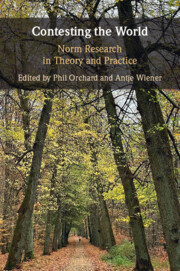Book contents
- Contesting the World
- Contesting the World
- Copyright page
- Contents
- Figures
- Tables
- Contributors
- Acknowledgements
- Abbreviations
- 1 Introduction
- Part I Norm Strength, Collisions, and Conflicts
- Part II Development of the Field
- 5 A Brief History of Norms about Race
- 6 Emotion and Norms in International Shaming Practices
- 7 Advancing Rights through an Accountability Norm?
- 8 Beyond Appropriateness
- Part III Meta-theorising, Linkages, and International Law
- Part IV Dimensions of Norm Contestation
- References
- Index
7 - Advancing Rights through an Accountability Norm?
The Case of Multilateral Development Banks
from Part II - Development of the Field
Published online by Cambridge University Press: 01 November 2024
- Contesting the World
- Contesting the World
- Copyright page
- Contents
- Figures
- Tables
- Contributors
- Acknowledgements
- Abbreviations
- 1 Introduction
- Part I Norm Strength, Collisions, and Conflicts
- Part II Development of the Field
- 5 A Brief History of Norms about Race
- 6 Emotion and Norms in International Shaming Practices
- 7 Advancing Rights through an Accountability Norm?
- 8 Beyond Appropriateness
- Part III Meta-theorising, Linkages, and International Law
- Part IV Dimensions of Norm Contestation
- References
- Index
Summary
In 2015, UN Special Rapporteur on Extreme Poverty Philip Alston stated that the World Bank treats “human rights more like an infectious disease than universal values and obligations” because of its understanding of what constitutes political interference. The World Bank’s interpretation, replicated by the Multilateral Development Banks (MDBs) in the development finance regime complex, has shaped how activists hold the Banks to account. This chapter examines how the international accountability norm emerged through contestation with the World Bank and spread to be taken as given for the MDBs, as distinct from international human rights and environmental elemental regimes. It then documents how activists seek to protect human and environmental rights through the banks’ international accountability mechanisms as quasi-legal processes with implications for the banks’ culpability. Although there is an increasing recognition of some rights such as free, prior and informed consent and labour, the banks continue to view these as internal standards not legal obligations. The chapter then examines the extent to which the norm needs to be backed by hard law to be enforced, with efforts by the banks to maintain their international organisation immunity given legal claims as to their implication in human and environmental rights abuses.
Keywords
- Type
- Chapter
- Information
- Contesting the WorldNorm Research in Theory and Practice, pp. 115 - 130Publisher: Cambridge University PressPrint publication year: 2024

